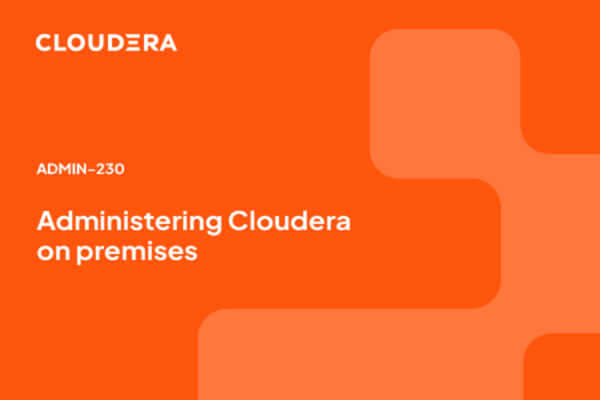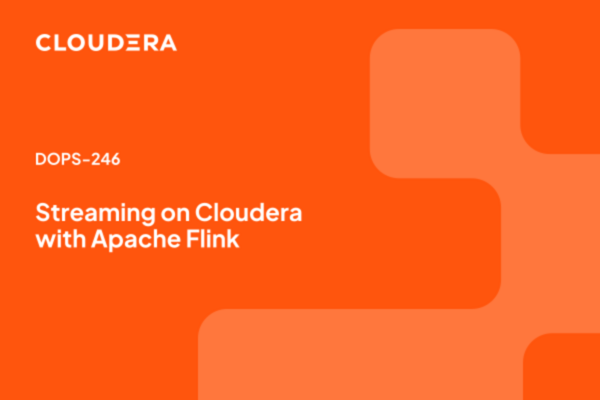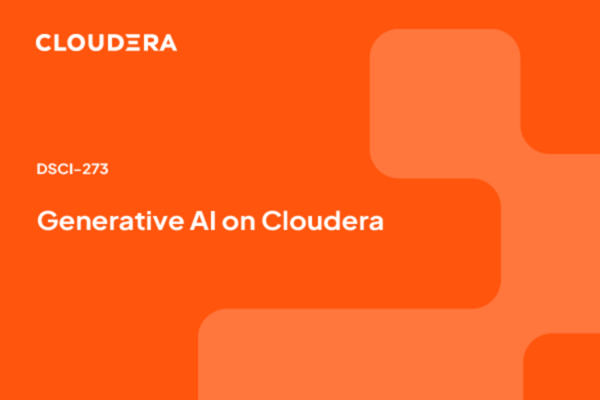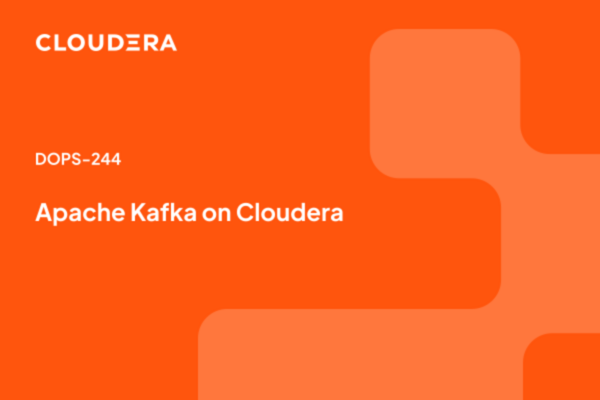Upcoming Sessions
-
March
3
ILT - Cloudera Custom Training - ADMIN-238 Administrating Kubernetes - 4935622 - AMER 1
Starting:2026/03/03 @ 09:00 AM Central Time (US & Canada)Ending:2026/03/03 @ 05:00 PM Central Time (US & Canada) -
March
5
ILT - Cloudera Custom Training - ADMIN-238 Administrating Kubernetes - 4935622 - AMER 1
Starting:2026/03/05 @ 09:00 AM Central Time (US & Canada)Ending:2026/03/05 @ 05:00 PM Central Time (US & Canada)
See All Upcoming Sessions

DATE: April 14-15, 2026 9:30 - 17:30 (SGT TIMEZONE) Virtual Classroom, APAC Read more

Cloudera is a fully integrated edge to AI product set. Cloudera Manager is purposely built as the DevOps tooling for building and managing the Cloudera platform. This four-day hands-on course presents detailed explanation, comprehensive theory, key skills, and recommended practices for successful platform administration. Upon completion of this course a Cloudera Administrator will learn the full range of functionality and capability of Cloudera Manager. DATE: April 7-10, 2026 9:30 - 17:30 (SGT TIMEZONE) Virtual Classroom, APAC Read more

This two-day instructor-led training course teaches students the development and operations skills needed to support Cloudera Streaming Analytics, a framework for low-latency processing and analytics powered by Apache Flink and Cloudera's innovative SQL Stream Builder. Through extensive hands-on exercises, students will gain experience deploying and managing a Flink cluster, developing and running Flink applications, and using SQL Stream Builder's continuous SQL to perform analytics on streaming data. DATE: July 20-21, 2026 9:00 - 17:00 (CEST TIMEZONE) Virtual Classroom, EMEA Read more

About This Training Generative AI (GenAI) and Large Language Models (LLMs) are extremely powerful new tools that are changing every industry. To fully take advantage of GenAI and LLMs, these new capabilities need to be combined with your existing enterprise data. This two-day course teaches how to use Cloudera AI to train, augment, fine tune, and host LLMs to create powerful enterprise AI solutions. What Skills You Will Gain Through lecture and Hands-On exercises, you will learn how to: Select the right LLM model for a use case Configure a Prompt for an LLM Use Retrieval Augmented Generation (RAG) Fine Tune an LLM Model with Enterprise Data Use the AI Model Registry and host an LLM Create an AI Agent with Crew AI Who Should Take This Course This course is designed for data scientists and machine learning engineers who need to understand how to utilize Cloudera AI to leverage the full power of their enterprise data, generative AI, and Large Language Models and deliver powerful business solutions. DATE: May 18-19, 2026 9:00 - 17:00 (CEST TIMEZONE) Virtual Classroom, EMEA Read more

Designing Edge to AI Applications is a 4-day learning event that addresses advanced big data architecture topics for building edge to AI applications to cover streaming, operational data processing, analytics, and machine learning. The workshop brings together technical contributors into a group setting to design and architect solutions to a challenging business problem. The workshop addresses big data architecture problems in general, and then applies them to the design of a challenging system. Throughout the highly interactive workshop, participants apply concepts to real-world examples resulting in detailed synergistic discussions. The workshop is conducive for participants to learn techniques for architecting big data systems, not only from Cloudera’s experience but also from the experiences of fellow participants. More specifically, this workshop addresses advanced big data architecture topics, including, data formats, transformation, transactions, real-time, batch and machine learning processing, scalability, fault tolerance, security, and privacy, minimizing the risk of an unsound architecture and technology selection. What you'll learn Cloudera Data Platform Big Data Architecture Building Scalable applications Building Fault Tolerant Solutions Security and Privacy Deployment on Public, Private, and Hybrid Cloud What to expect Participants should mainly be architects, developer team leads, big data developers, data engineers, senior analysts, dev ops admins and machine learning developers who are working on big data or streaming applications and have an interest in how to design and develop such applications on CDP. To gain the most from the workshop, participants should have working knowledge of popular Big Data and streaming technologies such as HDFS, Spark, Kafka, Hive/Impala, Data Formats, and relational database management systems. Detailed API level knowledge is not needed, as there will not be any programming activities and instead the focus will be on architecture design. The workshop will be divided into small groups to discuss the problems, develop solutions, and present their solutions. DATE: June 22-25, 2026 9:00 - 17:00 (GMT+2 TIMEZONE) Virtual Classroom, EMEA Read more

This four-day instructor-led course begins by introducing Apache Kafka, explaining its key concepts and architecture, and discussing several common use cases. Building on this foundation, you will learn how to plan a Kafka deployment, and then gain hands-on experience by installing and configuring your own cloud-based, multi-node cluster running Kafka on the Cloudera Data Platform (CDP). You will then use this cluster during more than 20 hands-on exercises that follow, covering a range of essential skills, starting with how to create Kafka topics, producers, and consumers, then continuing through progressively more challenging aspects of Kafka operations and development, such as those related to scalability, reliability, and performance problems. Throughout the course, you will learn and use Cloudera’s recommended tools for working with Kafka, including Cloudera Manager, Schema Registry, Streams Messaging Manager, and Cruise Control. DATE: July 6-9, 2026 9:00 - 17:00 (GMT+2 TIMEZONE) Virtual Classroom, EMEA Read more
Shopping Cart
Your cart is empty
